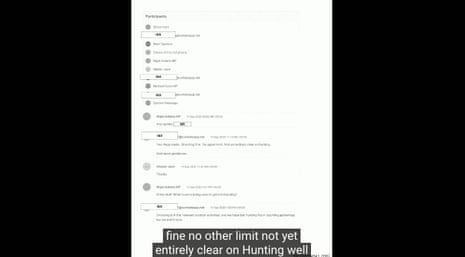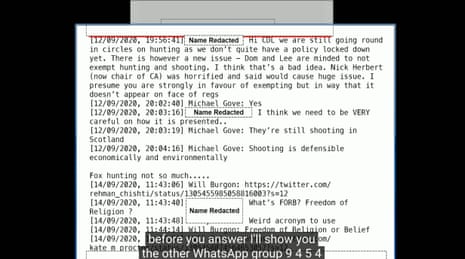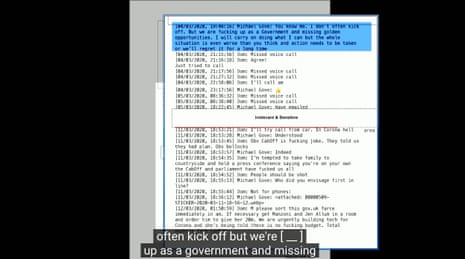No 10 says Sunak cancelled Greek PM meeting after assurances about Parthenon marbles debate not kept – UK politics live | Politics
No 10 says Sunak cancelled meeting with Greek PM because ‘assurances’ about Parthenon marbles debate were not kept
Downing Street has defended Rishi Sunak’s decision to cancel a meeting with his Greek counterpart, Kyriakos Mitsotakis, after Mitsotakis made the case for the Parthenon marbles to be returned to Athens on the BBC on Sunday.
Asked to explain Sunak’s decision, the PM’s spokesperson told journalists at the lobby briefing this morning:
The UK and Greece relationship is hugely important, from our work together in Nato, to tackling shared challenges like illegal migration and joint efforts to resolve the crisis in the Middle East and the war in Ukraine.
When requesting a meeting with the prime minister this week, the Greek government provided reassurances that they would not use the visit as a public platform to relitigate long-settled matters relating to the ownership of the Parthenon sculptures, which would only serve to distract from those important issues I just outlined.
Given those assurances were not adhered to, the prime minister felt it would not be productive to hold a meeting dominated by that issue, rather than the important challenges facing Greek and British people.
The deputy prime minister was available to meet the Greek prime minister to discuss the wider topics and we are disappointed the prime minister opted not to take this meeting.
Key events
Gove suggests Westminster did not consult with Scottish government at some points because SNP exploited grievances
Back at the inquiry, Michael Gove admits the decision to change the UK government’s official advice from “stay at home” to “stay alert” was not communicated to the Scottish government first.
Asked why that was, Gove says the UK government discussed many things with the Scottish government.
But he goes on to say that the Scottish government was led by a party (the SNP) that sometimes has a desire to exploit grievances against the Westminster government. The SNP is also tempted “to exaggerate the impact of a mistake or an error in order to feed a broader political mission”.
Hugo Keith KC, counsel for the inquiry, says the heads of the devolved governments, in their witness statements to the inquiry, have denied acting from “venal political motives” during Covid.
Gove says in Wales and Northern Ireland the first minister was from a unionist party. But the SNP is different, he says, because it wants to leave the UK.
Helena Smith
Greek officials who travelled with Kyriakos Mitsotakis to London have vigorously denied any suggestion that a pledge had been made to eschew the contentious cultural issue during Tuesday’s aborted meeting of the two leaders.
“We have many topics to discuss,” said Tassos Hatzivasileou, a New Democracy MP clarifying that the Parthenon sculptures were one of many the Greek contingent had planned to raise in talks with the British prime minister. He went on:
The agenda was not a single-issue one, nor is it going to be. But unfortunately what are the British doing? They, alone, are politicising the whole affair.
Hatzivasileou, who advises the Greek leader on international affairs and was part of the visiting team, downplayed the role of the UK government in ongoing negotiations over the antiquities, saying Athens’ counterpart in the discussions was the British Museum, home of the ‘exiled’ artworks for the past two centuries, not Downing Street. He said:
Sunak’s choice to cancel the meeting essentially politicises the whole process which only indirectly concerns the British government.
The prime minister did not say anything new (in his Sunday interview with the BBC). He repeated, yet again, and very clearly, well-known Greek views regarding reunification of the Parthenon sculptures.
It was evident, he said, that Rishi Sunak was acting under pressure from public opinion polls ahead of general elections in the UK next year.
2024 is a year of elections in the UK and the pressure of polls showing the Labour party ahead with 20 percentage points obviously pushed the British side into making this diplomatic foul … but it is a pity because our relations with the British are far-reaching. We have a strong friendship with a strategic base.
Keith told the inquiry that there was a specific WhatsApp group set up to discuss the with the hunting and shooting issues. As well as Gove, its members included Simon Hart (now chief whip, Welsh secretary at the time, and a former chief executive of the Countryside Alliance), Mark Spencer (chief whip at the time, and a farmer), Nigel Adams (a Foreign Office minister at the time, and a close ally of Boris Johnson’s) and Alistair Jack (Scottish secretary then and now).

Gove denies claim WhatsApp exchanges show decision to exempt hunting and shooting from Covid rules was covered up
Michael Gove, the levelling up secretary and former Cabinet Office minister, is back at the Covid inquiry.
Hugo Keith KC, counsel for the inquiry, asks about a decision taken in the autumn of 2020 to exempt hunting and shooting from Covid restrictions. He shows WhatsApp exchanges referring to them.
In a message on 12 September 2020, an official (not named) puts it to Gove that he assumes Gove is “strongly in favour of exempting (hunting and shooting) but in a way that doesn’t appear on face of regs (regulations)”. Gove replies: “Yes.”

Asked about the exchanges, Gove rejects suggestions that he was trying to conceal the fact that he was making an exemption for the two sports (which are popular with some Tory supporters). Gove claimed he was just trying to ensure that the rules were applied in a consistent manner.
Greek minister says Sunak’s snub to his PM ‘bad day’ for relations between two countries
A Greek minister has said that Rishi Sunak’s decision to snub Kyriakos Mitsotakis was “a bad day” for relations between the two countries.
In an interview with Radio 4’s World at One, Adonis Georgiadis, the Greek development minister, said:
It was a bad day. I think your prime minister, when he will have a second thought, he will understand that the Greek prime minister is an important person.
The Greek people have re-elected him and put their trust in him.
I have to be very honest — what Kyriakos Mitsotakis mentioned in his interview is not just his own opinion.
It is the single one opinion of 11 million Greek people and I think many more million people around the world.
No 10 says Sunak cancelled meeting with Greek PM because ‘assurances’ about Parthenon marbles debate were not kept
Downing Street has defended Rishi Sunak’s decision to cancel a meeting with his Greek counterpart, Kyriakos Mitsotakis, after Mitsotakis made the case for the Parthenon marbles to be returned to Athens on the BBC on Sunday.
Asked to explain Sunak’s decision, the PM’s spokesperson told journalists at the lobby briefing this morning:
The UK and Greece relationship is hugely important, from our work together in Nato, to tackling shared challenges like illegal migration and joint efforts to resolve the crisis in the Middle East and the war in Ukraine.
When requesting a meeting with the prime minister this week, the Greek government provided reassurances that they would not use the visit as a public platform to relitigate long-settled matters relating to the ownership of the Parthenon sculptures, which would only serve to distract from those important issues I just outlined.
Given those assurances were not adhered to, the prime minister felt it would not be productive to hold a meeting dominated by that issue, rather than the important challenges facing Greek and British people.
The deputy prime minister was available to meet the Greek prime minister to discuss the wider topics and we are disappointed the prime minister opted not to take this meeting.
The Covid inquiry has stopped for lunch. It will be back at 1.35pm. Lady Hallett, the chair, says the lunch break is a bit shorter than usual today because they have so much evidence to get through.
Back at the Covid inquiry, Hugo Keith KC, counsel for the inquiry, asks Michael Gove if he agrees with Helen MacNamara, the deputy cabinet secretary, that having the Covid-S and Covid-O committees dealing with Covid meant that too few people were involved in the key decisions.
Gove says he does not accept that. He says the full cabinet is too unwieldy to take proper decisions.
Keegan accused of showing ‘contempt for teachers’ after she unveils plans for school minimum service levels during strikes

Sally Weale
Teaching unions have reacted with anger after the education secretary, Gillian Keegan, announced plans to introduce minimum service levels (MSLs) in schools to protect children in the case of strike action.
She launched a consultation on the new proposals today after talks with unions to draw up a voluntary agreement collapsed. It includes plans to prioritise attendance for vulnerable children, exam groups, children of critical workers and primary school pupils, as well as the use of rotas for strikes lasting five days or more.
Keegan said:
Keeping children in school is my number one priority. Last year’s school strikes were some of the most disruptive on record for children and parents with 25 million cumulative days lost, alongside the strike action that badly affected students in colleges and universities.
We cannot afford a repeat of that disruption – particularly as young people continue to catch up from the pandemic. Whilst I know many schools and colleges worked really hard to keep children and young people in face-to-face education during strikes, we must make sure that approach is applied in every school, in every area of country.
Unions were unanimous in their opposition. Patrick Roach, the general secretary of the NASUWT teachers union, accused the government of trying to bully teachers into silence. He said:
The government is once again demonstrating its contempt for teachers, at a time when they should be listening to the concerns of the profession and facing up to the crisis in recruitment and retention they have created.
Daniel Kebede, the general secretary of the National Education Union, added:
This is a fundamental attack on the democratic freedoms and rights of school staff. It also demonstrates the government’s incredible lack of understanding that schools already ensure is in place for students on strike days.
And Geoff Barton, the general secretary of the Association of School and College Leaders, said:
Minimum service levels are a profoundly illiberal policy by a government that has lost the argument. Nobody wants to go on strike. It is action that is taken as a last resort when all else has failed. But passing a law which effectively removes the right to strike from groups of employees is obviously done in order to weaken unions and the voice of employees over their pay and conditions.
Gove says he should have pushed more firmly for full lockdown in week before it was announced
Q: Why did you not call for lockdown in the Cobra meetings you attended in the week starting 16 March?
Gove says he believes he had communicated his views. Sometimes as a minister, when chairing a meeting, you have to act as a neutral chair. He says he was asked by a PM to chair a Cobra meeting then, and he felt he ought to be neutral.
Q: Do you regret not being more forthright?
Gove says normally people are not happy when he is forthright. But he accepts on this occasion he should have been.
Gove says he also read articles about the case against lockdown.
But he says the Swedish approach to Covid was more similar to the UK’s than some people claimed, because people there voluntarily restricted their social contacts even though legal restrictions were not in force as they were in the UK.
Gove says he would have backed full lockdown on 16 March 2020
Keith says the decision to order people to stay at home on 16 March 2020 had a considerable impact on people’s behaviour.
Q: Why did you not wait until there was a bit more data before going ahead with the full lockdown?
Because the virus was spreading exponentially, Gove says.
Keith says ministers knew the virus was spreading exponentially earlier in March.
Gove says he personally was pressing for the most vigorous action earlier.
Q: Would you have backed a lockdown on 16 or 20 March?
Yes, says Gove.
He says this article, by Tomas Pueyo, had a decisive impact on this thinking.
Gove rejects claims Johnson dithered unreasonably over introducing first lockdown
Keith puts it to Gove that Johnson was not just someone who liked testing both sides of an argument before taking a decision. He puts it to Gove that Johnson was someone reluctant to take a decision, or unwilling to stick to a decision he had taken.
Gove says he does not accept that, at least in this case.
He says Johnson was entitled to test the arguments. Johnson ended up taking the right decision, he says. But he accepts it may have taken Johnson “a little longer, to come to that conclusion than others”.
Gove defends Johnson’s approach to taking decisions, saying he liked to fully consider both sides of argument
Q: Dominic Cummings says, in the week starting Monday 16 March (the day Boris Johnson told people to stay at home), the PM was oscillating as to whether further measures were required.
Gove says this was difficult. He claims Johnson did not find taking decisions difficult. But he says he was a liberal, and found the idea of restricting free association deeply difficult. It was opposed to his world view.
To contemplate such a big measure was a decision of huge weight, he says.
Gove says his personal view was that such a decision was inevitable.
But he says Johnson would instinctively have felt unhappy with all these decisions, including closing schools.
As for Johnson’s oscillating style, he says Johnson liked to hear the thesis and then the antithesis before taking a decision. He goes on:
He preferred gladiatorial decision-making rather than inquisitorial. He wanted to see the two cases or the three cases rehearsed in front of him, or even rehearsed in his own mind.
Any prime minister is entitled to test propositions and to think ‘is the restriction of liberty and the economic damage consequent upon lockdown worth inflicting on people in order to prevent the spread of this virus’?
Gove says some people found this approach difficult.
But he says he was used to Johnson being like this. He says all leaders have their own ways of taking decisions.
‘We are fucking up as a government’ – how Gove warned privately on 4 March that Cabinet Office failing
Keith shows Gove an extract from an exchange of messages between Gove and Dominic Cummings. On 4 March 2020 Gove told Cummings that the government was “fucking up” and that the situation was worse than he thought.
Gove said:
You know me, I don’t often kick off but we’re fucking up as a government and missing golden opportunities. I will carry on doing what I can but the whole situation is even worse than you think and action needs to be taken or we will regret it for a long time.

Gove says he was concerned about the ability of the government to deliver.
Covid was on my mind, but it wasn’t the principal thing that I was messaging about. It was about the Cabinet Office overall, including its ability to deal with Covid.
He apologises for his language.
This set of exchanges, shown to the inquiry, also shows Cummings saying to Gove in a message on 11 March 2020 that “people should be shot” because government handling of the crisis was so bad.
Keith asks why the government did not realise in early March that it needed to stop the spread of Covid.
Gove says ministers accepted the view of Chris Whitty, the chief medical officer, that there was a limit to what could be done.
Lockdown measures were unprecedented. And the argument was that, if they were introduced too early, they would have to be lifted because people would not put up with them for too long.


